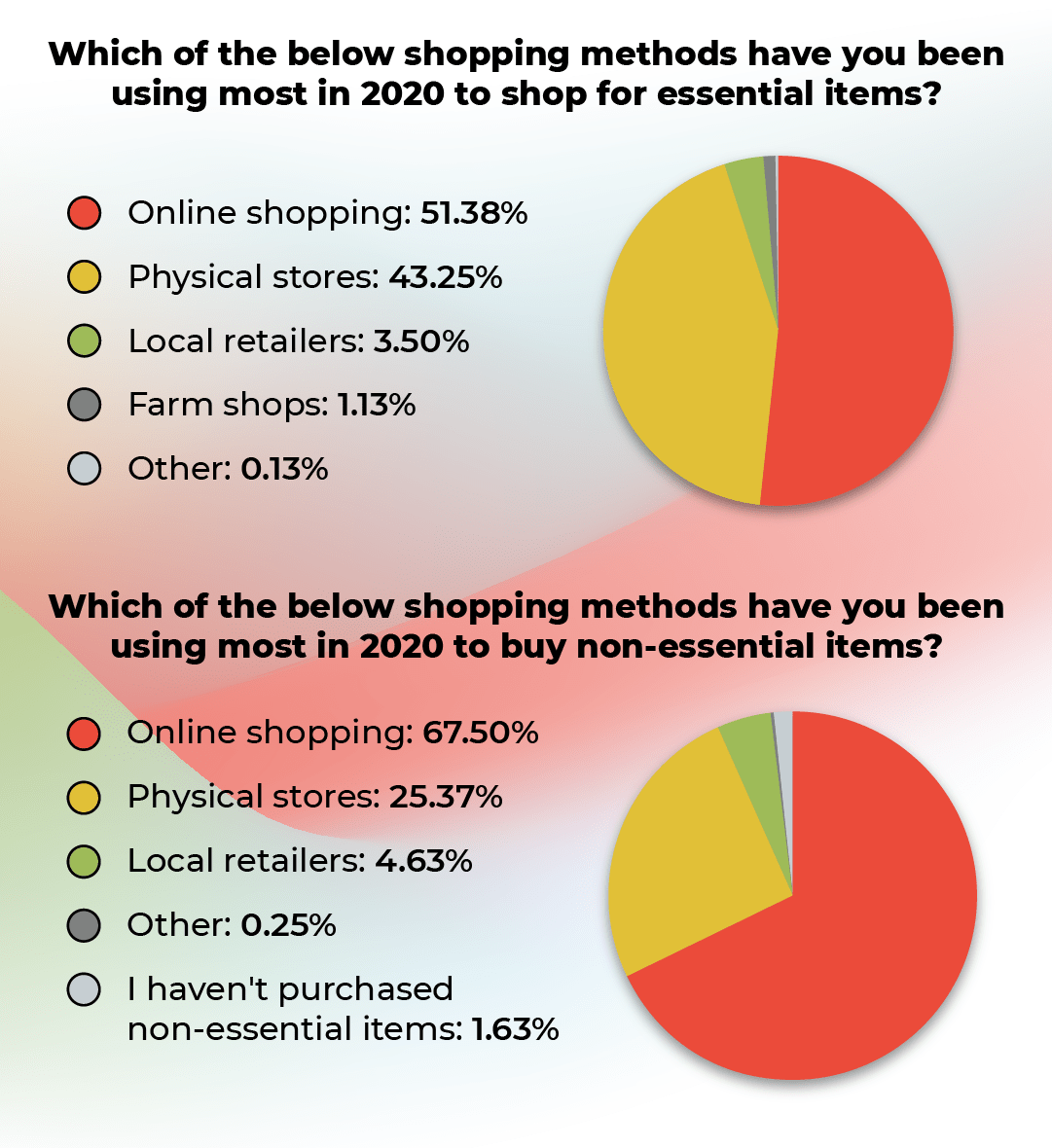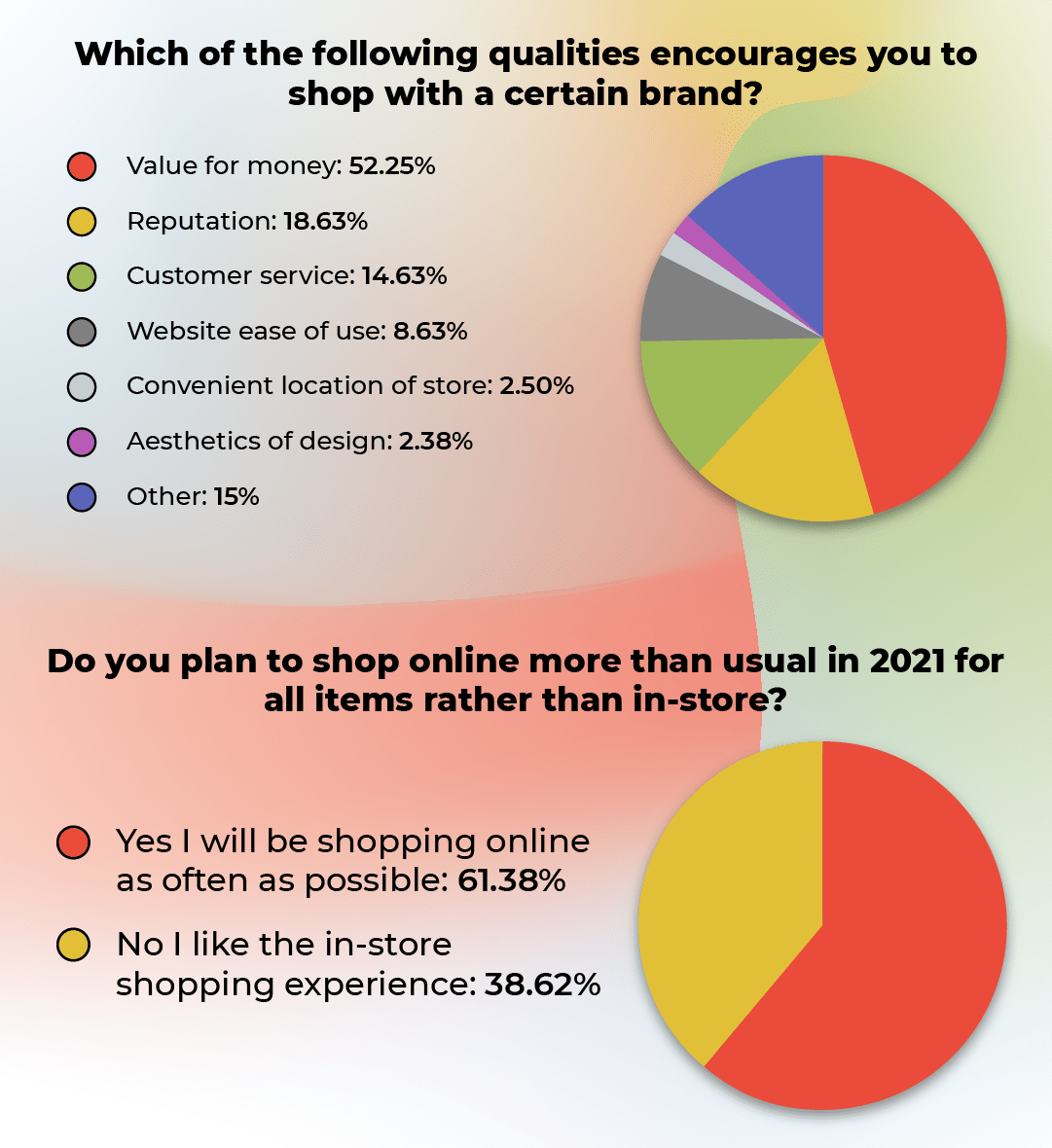In our ever-changing world, consumers expect a lot more from their customer...
Read more
With regional lockdown restrictions designed to curb the spread of COVID-19 still very much in place across the UK as we enter 2021, the ways in which businesses, shops, pubs and restaurants operate are continuing to adapt. Naturally, after months of society in the UK also attempting to adapt to a so-called ‘new normal’, predicting just how significantly the pandemic has changed our day-to-day lives going forward into the new year is a challenge.
With this in mind, here at CallCare we wanted to assess just how much the pandemic, and all the restrictions that have come with it, has changed consumers’ shopping habits and the expectations people have towards customer services as we head into 2021. To do this, we asked 800 UK residents – from a mixture of different locations, age groups, professions and walks of life – a selection of questions relating to their views on how they think their customer service expectations and general shopping habits changed in 2020. Check out some of our most interesting findings below.
Although shops and retail outlets have been able to reopen in many areas, albeit with mandatory COVID-secure measures in place to protect employees and shoppers alike, it will probably come as little surprise that our survey did reveal that the pandemic has significantly altered our shopping habits.
Perhaps unsurprisingly, we found that when asked which shopping methods people had utilised most in 2020 to shop for essential items, the most popular answer, accounting for over half of our respondents (51 per cent), was online shopping. This figure rose significantly to a whopping 98 per cent of those questioned when asked about their preferred method of shopping for non-essential items during 2020. However, while it is predicted by some that these new habits could permanently change the way people in the UK like to shop going forward, our findings suggest otherwise. Despite a massive boost in popularity for online shopping last year, over a quarter of respondents (27 per cent) admitted they are likely to go back to doing their shopping in physical stores when it’s safe to do so in 2021, as they miss the ‘in-store shopping experience’.
That being said, aside from the increased safety aspect of shopping online from home during the COVID pandemic, our survey suggests that this modern form of purchasing also has a number of other major benefits that has seen the medium become more popular. According to our sample, nearly a third of people (29 per cent) spend between one and two hours researching their purchases before actually buying, with a further 28 per cent of 16 to 54 year olds admitting to researching potential purchases for anywhere between two and four hours before checking out. This is a practice that is much easier when sat with the internet at your disposal rather than when walking around a physical shop. On top of this, the fact that only 21 per cent of respondents confessed to being ‘impulsive shoppers’ perhaps suggests that online shopping is becoming more popular due to the changing nature of our shopping habits, regardless of the restrictions put in place in brick-and-mortar shops due to the pandemic.
Finally, although our survey revealed that 40 per cent of the people we questioned believe they spent roughly the same amount on shopping in general in as they did prior to the first lockdown starting in March 2020, a significant 31 per cent admitted that they are spending ‘a lot more’ on non-essential items, specifically online. Interestingly, we found it was those aged between 16 and 34 to be spending the most online. When this finding is combined with the fact that those aged 45+ were revealed to be less likely to shop online – instead opting to go to the supermarket, especially for essential items during the pandemic – there is a clear age divide when it comes to preferred method of shopping. However, we will have to wait and see if these trends will continue into 2021 as restrictions (hopefully) start to lift.

As well as changing shopping habits, here at CallCare we wanted to know if shoppers’ expectations when it comes to customer services also changed in 2020. Interestingly, according to a recent KPMG study, UK customer experience actually improved in 2020, despite COVID-19. iIt is thought a big part of that is down to businesses – particularly in the retail, financial services, and restaurant and fast food industries – having to rapidly adapt and modernise their customer service processes in order to survive the pandemic.
While our survey showed that when it comes to the qualities UK shoppers looked for in a business, ‘good customer service’ came third in their list of priorities behind ‘value for money’ and ‘overall reputation’, this area does still play a key role. According to Think with Google, improved customer service procedures are one of the main reasons why only 33 per cent of UK shoppers faced an issue shopping online in 2020, compared to 41 per cent in 2019, for example. This improvement is perhaps reflected in our own survey, which found that, when compared with several other industries, the standard of customer service in the retail industry was consistently ranked as one of the best by the majority of our 800 respondents, finishing just behind healthcare.
According to industry experts eMarketer, online sales increased by a massive 35 per cent in 2020, accounting for 30 per cent of all retail sales in the UK for the first time, up from 22 per cent in 2019. However, with the amount of online shoppers in 2020 significantly higher than in 2019, have new concerns around privacy and data security emerged? Well, as well as suggesting that the majority of people (more than seven out of 10) are indeed concerned about the amount of personal information they share with companies online, our survey also found that 51 per cent of people worry about their privacy more generally when contacting a company’s customer service department. Interestingly, this figure is not greatly different from that presented in ComRes Global’s 2017 study into consumer attitudes to digital identity, which found that 57 per cent of Britons worry about how much personal data they have shared online. This similarity perhaps suggests that an increase in online shopping in 2020 has not led to more people worrying about their online privacy. Indeed, our survey also found that 19 per cent of respondents haven’t really even thought about it at all.
The impact of a bad customer service experience can be huge. It can be enough for a customer to abandon a purchase, stop shopping with a certain retailer all together, and even cause irreparable word-of-mouth reputational damage. But did the unique circumstances shoppers faced in 2020 change the way they reacted to bad customer service? Well, according to our survey, a quarter of respondents (25 per cent) said they would never shop with a brand again following a bad customer service experience, while 18 per cent of respondents said it would depend on the price of the item they were looking to purchase.
Interestingly, according to research from Ombudsman Services in 2016, around 79 per cent of UK shoppers said they would avoid a brand or company if they have received poor customer service in the past. This difference in findings perhaps suggests that, although negative customer service experiences are certainly bad for business, shoppers in 2020 are maybe more sympathetic or patient, possibly as a result of the COVID-19 disruptions. However, it is still unclear if this trend will continue into 2021.
So there you have it – a fascinating insight into the minds of UK shoppers during the 2020 COVID pandemic. Shopping habits have, of course, changed and been shaped by circumstances, as have attitudes towards customer service in the wake of lockdowns and additional restrictions. However, as the pandemic continues to affect day-to-day life for many in the UK, it still remains to be seen how shopping habits will alter as we enter 2021.
